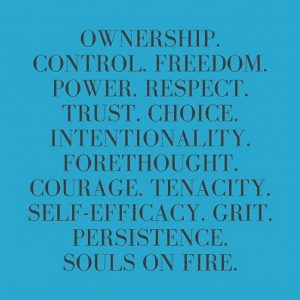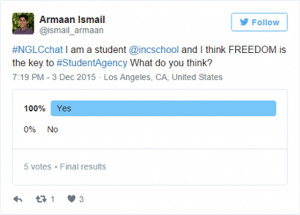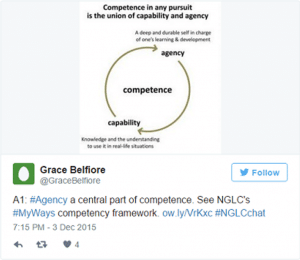How Next Gen Learning Can Support Student Agency, Part 1
CompetencyWorks Blog
 This post is adapted from the Next Generation Learning Challenges‘ Friday Focus.
This post is adapted from the Next Generation Learning Challenges‘ Friday Focus.
Happy New Year! As I reflect back on 2015, I find myself thankful for the opportunity to learn from and be inspired by all of you in the NGLC network. Case in point: December’s #NGLCchat on Student Agency. As a parent, I wholeheartedly want my children to be agents of their own lives, growing into adults who are empowered to question the world and confident in their ability to change it for the better. But today, I just want them to put on their shoes so we can get to school on time, to wear sneakers instead of flip flops because it’s cold outside, and to do it in the next three minutes—so I make demands and expect them to do what I say and cross my fingers they don’t question me or throw a tantrum. Ugh! There’s a place for authority, rules, and compliance—I do need to ensure my kids are safe from harm, healthy, and respectful of others. But my real job—nurturing their heart, mind, body, and soul—is hard. That’s why it was so uplifting to learn from educators like you during the chat, educators with the passion and commitment and strength and expertise to recognize the agency within students and enable them to be agents of their own learning today and their own success tomorrow.
The hour-long chat was chock-full of expert thinking, advice, resources, and inspiration. For today’s edition of Friday Focus, I tried to pull it together, make meaning, and organize the wealth of insight provided by all the participants during the first segment: “Define what student agency means. What does it look like?” In an upcoming Friday Focus, I’ll dive into the next segments when participants explored how blended learning, competency-based learning, and project-based learning can support student agency.
Why Student Agency Is So Important
Why are we talking about Student Agency? Because agency underpins the whole broader, deeper range of MyWays competencies needed for student success. And today’s students NEED the skills to be lifelong learners:
Harvard professor Roland Barth has observed that in the 1950s when young people left high school they typically knew about 75% of what they would need to know to be successful in life. Today, he predicts that young people know about 2% of what they will need to know. (Barth, R.S. (1997, March 5). The leader as learner. Education Week, 16(23). 56.) This shift is not because young people are learning less than previous generations. In fact, there is good evidence that they know much more. The force behind this change is the rapid and ever-increasing pace of change, the complexity of the world in which we live and the unpredictability of what people will need to know in the coming decades – the future for which we are preparing today’s learners.
Understanding Student Agency
Student agency is a bold concept, demonstrated by the words participants used to describe what student agency requires and how it is exhibited:

But student agency is more complex than what is captured in a collection of related words.
Ownership & Persistence: Agency is present when students take charge of who, what, where, why, and when they learn. This includes choice, self-awareness, self-management, social relationships, responsible decisions, time management, organization, and self-regulation on the way to a long-term, personalized goal.
Agency also requires tenacity and grit. It involves persistence to tackle challenges, to use failure along the way to success, and to embrace curiosity, creativity, and innovation as essential as breathing.
Students exhibit agency when they persevere, not just feeling in control but having the skills and tools to persist when challenged. We don’t give young people enough credit for their ability to take on significant challenges, and facing challenges may be a necessary prerequisite for becoming strong adults.
A Student’s Perspective: What conversation about student agency is complete without asking students what they think? One thread during the chat looked to the EdSurge article by Davidson College student Andrew Rikard who defines agency as recognizing the responsibility to take action in a world that needs makers and creators. He also said that agency isn’t something you give or take, it’s collaborative. It is a two-way street, part of a school’s culture. Armaan Ismail, a student at Incubator School, started another thread of conversation when he joined the chat, this one about freedom:

Empowerment, not Learned Helplessness: Another thread during the chat focused on how children recognize their agency in relation to their environment. Agency is being in control of what happens around us, where we can influence events. And that starts with children believing that they can actually change or reshape their environment through their actions. When the environment is unpredictable, turbulent, and non-responsive to a child’s actions, the child learns that they have little or no effect on the environment and are, in fact, powerless. A poor environment leads to learned helplessness in place of agency.
In How Children Succeed, Paul Tough describes how adverse childhood experiences create a hostile environment for students. Our schools exacerbate this when they teach compliance and prioritize getting the one right answer, both of which produce learned helplessness. To avoid learned helplessness, we need learning environments that empower students. When students are empowered, they can take an active role in their life path.
To sum up all of these ideas about agency, I like the imagery and impact of the MyWays definition of student agency that Grace Belfiore shared: “A deep and durable self in charge of one’s learning and development.”

How often do we think of ourselves as deep and durable and in charge? How wonderful would it be to have a generation of deep and durable and in charge citizen-learners in our midst?
Promoting Student Agency
This list includes strategies that guest experts and other participants shared as a way to describe what student agency looks like in the classroom and how schools can honor and encourage agency in the learning process, helping students learn not only that they can influence the world around them but also develop the tools and skills to do so.
- Reflection. Students reflect on their learning, make connections to their prior learning, and engage in ongoing conversation through writing and dialogue.
- Transparency. Students need to know where they are to know where to go.
- Scaffolded and thoughtful teacher prep. Agency looks and sounds different for every student, and prepared teachers can more effectively release control to students.
- Teacher modeling. Students need the support of their school leaders so teachers and administrators need to self-monitor as well.
- Self-direction. Students are empowered to work on their own or collaboratively on assignments and projects at their own pace. They engage in learning strategically without waiting to be directed.
- Choice. More than providing a menu of options, choice provides students with control leading to lower stress and more capable students.
- Growth. Students work in their zone of proximal development, at exactly their level, all day every day. There’s a school-wide growth mindset.
- Real roles. Agency lives when students take on the role of inventor, artist, scientist, scholar. Agency increases when we provide broader and deeper student experiences. Historically, this was more often found in extracurriculars than in the classroom. Today, classrooms may provide whole game learning opportunities.
Resources
The resources—all of them are also embedded in the narrative above—provide greater understanding about student agency than we were able to cover in the chat. (Did I mention all of this information came in just the first 15 minutes of the chat?!) Use this collection to continue to explore what student agency is and what it looks like.
Student Perspectives
- ’Student Agency’ Is Not Something You Give or Take – Andrew Rikard, EdSurge. “We can’t continue to frame agency as something that educators give to students. That feeds into the old model of knowledge transmission, where educators stand up and give information to students. Developing ‘agency’, on the other hand, is a collaborative effort where both parties stand to gain (and lose).”
- What School Should Be: The Strength of Student Voice – Megan Mead and Caroline Vander Ark, Getting Smart Blog. “For our team the day was a good reminder of the strength of the student voice. These young leaders came with a solution oriented mindset that is necessary to enact change.”
Teacher Perspectives, Learning Design and Instructional Strategies
- Are You Ready to Be a Change-Agent for Agency? – Susan Lucille Davis, Getting Smart Blog. “We chose the profession of teaching because we love learning and we wanted to make an impact on the future our students will inhabit. We wanted to be change-agents. Yet we snatch agency from our students even as agency is snatched from us….”
- A Teacher’s Tale of Technology, Trust and the Struggle for Freedom – Daniel Guerrero, EdSurge. “As I tried to survive my first year as a teacher, I understood that my classroom was a part of my students’ larger struggles. I felt I owed them an education where they could experience freedom, purpose, and happiness, which in turn could help propel them through their lives.”
- 23 Questions that Cultivate Deeper Learning Mindsets – Bonnie Lathram, Getting Smart Blog. “Professional learning opportunities that include time to wrestle with big questions and to reflect on our own learning will help educators model what deeper learning advocates call academic mindsets, loosely defined as the skills, dispositions and mindsets positively associated with academic success.”
- MyWays Exercise 2: Learning Design as Rich as Your Definition of Student Success – Dave Lash & Grace Belfiore for NGLC (slide deck). “Next generation learning designs that feature a heavy focus on situated learning experiences are most likely to develop capability and agency. Three key learning design constructs are of particular value: Whole Game Learning, Levers for Capability and Agency, and Wider Learning Ecosystems.”
- Avoiding “Learned Helplessness” – Andrew Miller, Edutopia. “Wanting to get the one right answer prevents students from being creative with their learning, to show what they know in new and inventive ways.”
- Chapter 12. Learning Through Reflection – Arthur L. Costa and Bena Kallick, Learning and Leading with Habits of Mind. “Teachers who promote reflective classrooms ensure that students are fully engaged in the process of making meaning. They organize instruction so that students are the producers, not just the consumers, of knowledge.”
- How Teachers Use Paper Blogging to Promote Student Voice – Dave Guymon, Getting Smart Blog. “Paper blogging serves as an entry point to reflective writing, offline discussions about digital citizenship, and best of all, continuing conversations through commenting.”
- 7 Ways to Hack Your Classroom To Include Student Choice – Amanda Ronan, Edudemic. “The psychological effects of feeling a sense of control are well-documented and include greater levels of happiness and activity and lower levels of stress and anxiety. Educational research has shown that choice leads to more confident, more capable, and more interested students.”
- Choice is More than a Menu of Options – Personalize Learning Blog. “If learners are choosing from a set of pre-planned choices from a computer program or a list of options from the teacher, then the teacher is ultimately the one responsible for the learning not the learner.”
- Student Agency is What Counts – Keara Duggan, Next Gen Learning Blog. “I’ve seen a dramatic shift over the past 18 months as teachers and leaders think more deeply about how to develop student agency and student reflection as a core part of redesigning classroom and school models. Student ownership, agency, and choice are all critical to the personalization process.”
Student Success and What the Research Says
- Learner Agency: The Missing Link – Personalize Learning Blog. “Learners must understand (a) when they need new learning and how to learn what they need, (b) when they need to unlearn what will no longer serve them, and (c) when they need to relearn what they need to be successful.”
- It’s Time to Trash the Terms “Non-Cogs” and “Soft Skills” – Andy Calkins, Next Gen Learning Blog. Agency ‘encompasses the self-efficacy and -management capacities that our standards-era, No Excuses-driven focus on ELA and math proficiency has overlooked. It embodies ownership and deep engagement – the pillars on which virtually all of the new models of personalized, next gen learning schools are being designed and built.”
- MyWays Exercise 1: Fine-Tuning Your Definition of Student Success – Dave Lash & Grace Belfiore for NGLC (slide deck). “The behaviors, skills, and dispositions that comprise agency (as well as capability) ‘are local’ in the sense that an individual might be high-agency in one area, say math, but low-agency in English, social skills, or developing a personal roadmap to a new goal. Or vice versa. Accordingly, a key takeaway from the research is the importance of developing agency within specific competencies, rather than as a separate ability.”
- Success Takes Agency, Identity, and Competency – Tom Vander Ark, Getting Smart Blog. “Success is more than work readiness, according to the report, it, ‘Also means that young people can fulfill individual goals and have the agency and competencies to influence the world around them.’”
- Three Factors for Success: Agency, Integrated Identity, and Competencies – Chris Sturgis, CompetencyWorks Blog. “Agency is the ability to make choices about and take an active role in one’s life path, rather than solely being the product of one’s circumstances. Agency requires the intentionality and forethought to derive a course of action and adjust that course as needed to reflect one’s identity, competencies, knowledge and skills, mindsets, and values.”
- Motivation Matters: How New Research Can Help Teachers Boost Student Engagement – Susan Headden and Sarah McKay, Carnegie Foundation. Our report on motivation looks at the latest research around student engagement and agency.
- How Students Succeed – Paul Tough. Why do some children succeed while others fail? The story we usually tell about childhood and success is the one about intelligence: success comes to those who score highest on tests, from preschool admissions to SATs. But in How Children Succeed, Paul Tough argues that the qualities that matter more have to do with character: skills like perseverance, curiosity, optimism, and self-control.
- Teen 2.0: Saving Our Children and Families from the Torment of Adolescence – Robert Epstein. “Research on resilience suggests that exposure to great challenges may be essential for making young people strong as adults.”
- Positive Development in a Disorderly World – Reed Larson, Journal of Research on Adolescence. “Adolescents need to develop competencies to navigate an adult world that is complex and disorderly: a world of heterogeneous macro- to micro-ecological systems containing contradictions and catch-22s. This exploratory essay examines adolescents’ conscious processes of developing pertinent competencies for pursuing goals (agency) in these kinds of ‘real-world’ settings.”
Many thanks to everyone who provided these insights and resources including, but not limited to, the #NGLCchat guest experts!
- Grace Belfiore, Researcher and author, lead developer of MyWays project
- Dave Lash, Researcher and author, lead developer of MyWays project
- Andrew Miller, Consultant with Buck Institute and ASCD
- Casey Montigney, Teacher at Medill-Shue Middle School, member of the Carnegie Foundation’s Student Agency Improvement Community
- Michele Savage, Principal of Medill-Shue Middle School, member of the Carnegie Foundation’s Student Agency Improvement Community
See also:
- Avoiding “Learned Helplessness”
- 5 Ways to Build a Student Agency in the Digital Age
- Student Agency is What Counts
Kristen Vogt, knowledge management officer for NGLC, makes lessons, strategies and outcomes from NGLC grantee projects available to a wider audience. Kristen previously at the Woodrow Wilson Foundation in Princeton, NJ. Kristen also has past experience in student and academic affairs in higher education, in particular with first-year transition programs and student support. Kristen earned a B.S. in Mathematics from the University of Notre Dame, an M.A. in Higher Education from the University of Michigan, and a Ph.D. in College Student Personnel from the University of Maryland.